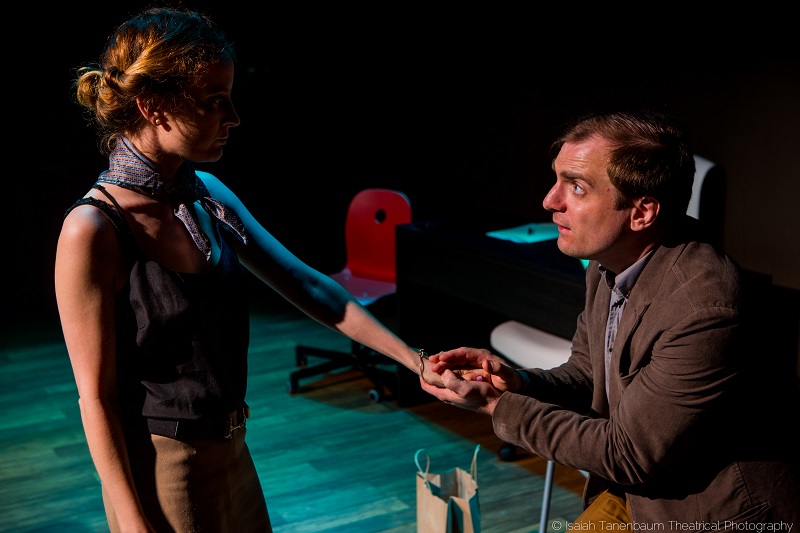
Playwright Lasha Bugadze makes the idea of needing some direction in life very literal in Navigator in Love, part of the Georgian-American Theatrical Feast taking place now through early August in Manhattan. The world premiere of Navigator, which won the 2012 BCC World Drama Award for Best International Play, in a translation by Maya Kiasashvili is one of an array of events that make up the festival, the aim of which is to introduce American audiences to nine playwrights from Georgia, a country of four million that is described in the program as lying "at the crossroads of Europe and Asia." This celebration of Georgia and its venerable cultural history and vibrant contemporary theatrical community includes two full productions, free readings, and special events with wine and music. (See www.redlabproductions.org for a full schedule.)
Navigator's point of origin is an elevator in the building where Rostom (Michael Propster) works for a construction firm. As Rostom talks too much to his boss Akba (Alan Altschuler) about the modern features of this new elevator, he also mentions that he feels bad for the operator, who has lost the job he had since Soviet times and who more or less lived in the lift. Rostom himself takes care of his mockingly critical disabled father (also played by Alan Altschuler, in a resonant bit of doubling), but he has just been promoted, and his rise in the ranks comes with a GPS-equipped company car, meant to enable him to inspect various construction sites to prod the workers to hurry along, if necessary. The car's navigator (voiced by Lauren Riddle) is another piece of human-replacing modern technology that is out of Rostom's comfort zone, particularly, it seems, because it involves a woman telling him what to do. Initially annoyed by the navigator, Rostom -- relatively quickly, all things considered -- finds himself in two-way conversations with it (or her) and receiving disembodied advice on his dress sense and on his unrequited love for his coworker Clara (Masha Dakic). Eventually, his heartfelt exchanges with the GPS inspire him to assert himself, to make himself noticed, leading him down a very different road than he has heretofore been following.
One question that obviously arises over the course of the play is whether Rostom is indeed driving around with a piece of sentient, emotional software, or if he is, to use his term, insane. Much as one can read the title in two ways (describing either the state of the navigator or describing what one navigates through), one could answer the aforementioned question either way. The inversions of his situation that occur might take on different shades of meaning, as might moments such as when Rostom references getting used to "my new reality." If the GPS is actually speaking to him, then the irony is heightened in that he is still being manipulated even as he asserts himself and his will. If the conversations have been a projection the whole time, then the climax of Rostom's final ride in the company car might be more symbolically fitting. However, the ambiguity does not greatly change what the play has to say, as it comes full circle by the end, about our dependence on and relationship to machines and algorithms, about our loneliness, self-construction, difficulty with change, and need for connections.
Rostom is reminiscent of Eugène Ionesco's multi-play protagonist Bérenger, a sort of bourgeois everyman who is simultaneously insecure and overconfident, as well as apt to be fixated on the wrong woman. Michael Propster, the center of a strong cast, plays Rostom as a man who blusters his way through discomfort, capably suggesting an inner turmoil and desperation that increasingly manifests itself outwardly. Masha Dakic's Clara packages in diplomatically dismissive laughter -- a tactic doubtlessly familiar to many women -- her attempts to redirect Rostom's infatuation. Brett Epstein, as Rostom's neurotic, medicated friend Jakeli, creates some great, expressively and often exasperatedly comic beats as he tries to protect the protagonist from himself; and Lauren Riddle succeeds in creating a character without ever appearing onstage, and is especially impressive when infusing that familiar GPS cadence with just a hint of emotion.
Navigator in Love is by no means the first work to structure itself around the concept of emotional attachment to a technological object (Ex Machina, Black Mirror, and Her, for example, have all explored similar territory within the last few years, and Clara even acknowledges that "It's pretty banal" when Rostov claims that he could write an article about how "Machines substitute humans" if only he were good at grammar), but the play engages its conceit with accomplished performances, deadpan humor, and a brisk pace aided by clever lighting and sound design. It is also not as if human alienation and artificial intelligence are topics that will lose their relevance any time soon: once you've finished having your Amazon Alexa tell you more about Georgian history and theater, just ask her. - Leah Richards and John Ziegler
